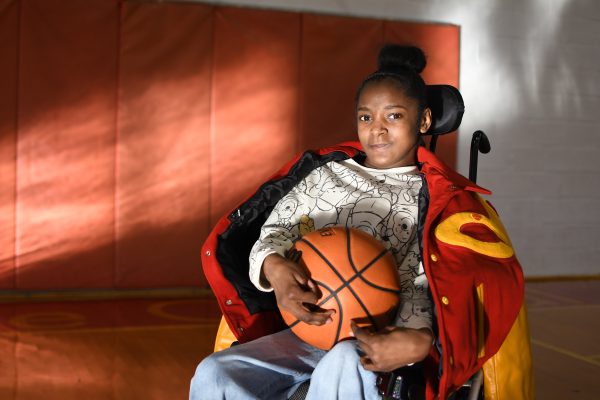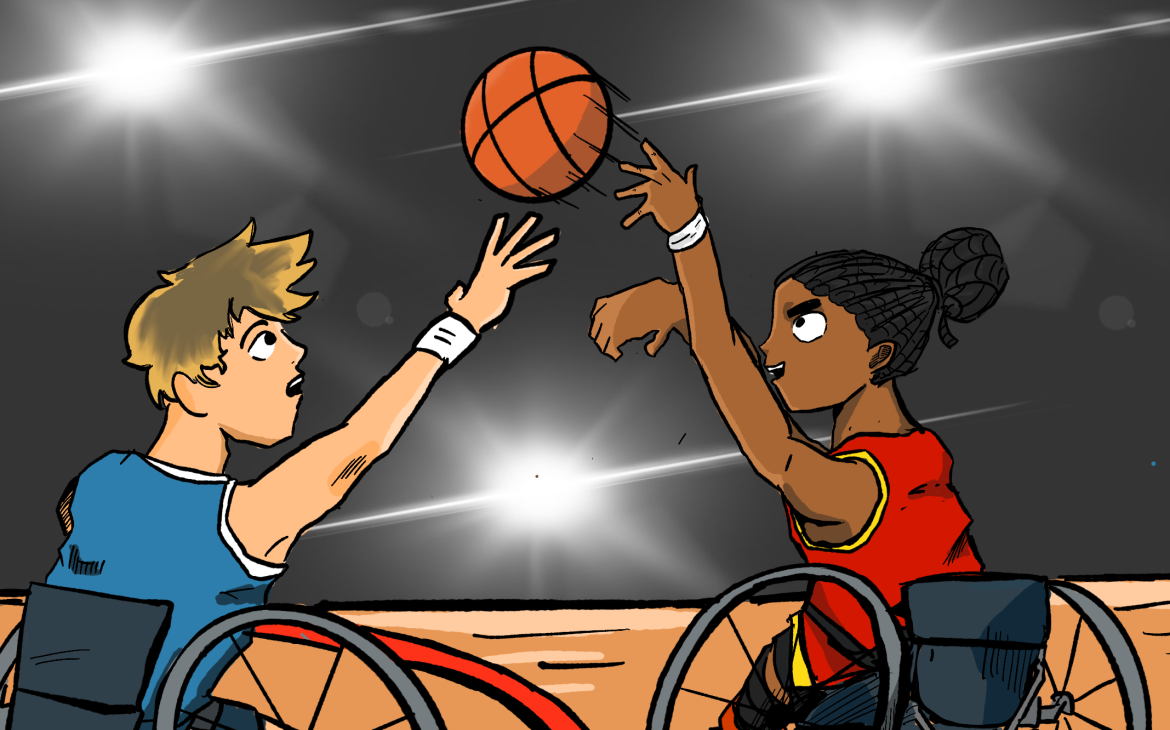Opposing Clarke County School District wheelchair basketball athletes compete on a basketball court. CCHS associate athletic director and CCSD adapted sports program coordinator Chris Aiken has worked towards the establishment of the adapted sports program since the Fall of 2023. “The whole initiative is just to provide another avenue where students can work together to achieve common goals,” Aiken said. Illustration by Sam Harwell
The CCSD was awarded the ASPIRE Grant from the American Association of Adapted Sports Program, jump-starting the establishment of a new adapted sports program.
Opportunities are expanding for Clarke County School District students as three district-wide, co-ed adapted sports teams are being established in the winter of 2023.
After receiving the American Association of Adapted Sports Programs ASPIRE grant for $30,500, CCSD can now provide wheelchair handball in the fall, wheelchair basketball in the winter and wheelchair football in the spring. The program is being led and coordinated by Clarke Central High School Associate Athletic Director Chris Aiken.
“Finding ($30,500) worth of funding to purchase all this equipment would have taken some time, but having the grant accelerates that process. On the front end, you get eight wheelchairs in the grant so that expense is taken care of for you, plus all the balls, equipment, basketball hoops, handballs (and) footballs,” Aiken said.
All three sports are sanctioned by the Georgia High School Association for interscholastic competition through AAASP for students with physical disabilities in grades 6-12, so varsity players may letter on the adapted teams. However, in the program’s pilot year, CCSD teams will be limited to junior varsity teams.
“I don’t want to jump into the established varsity division yet. Those teams have been playing for 15 plus years, are probably very well-rounded and have already been practicing for multiple months. Our goal is not to just throw people out there,” Aiken said.
“Finding ($30,500) worth of funding to purchase all this equipment would have taken some time, but having the grant accelerates that process.”
— Chris Aiken,
Clarke Central High School Associate Athletic Director
Though the adapted sports program will be a new addition to the district, adapted sports is not a new concept to the district.
Special Olympics, introduced to the district over 40 years ago, also serves disabled athletes, offering 30-plus Olympic-style individual and team sports to students with intellectual disabilities. However, AAASP offers three GHSA-sanctioned sports for students with physical disabilities. CCSD adapted physical education teacher and CCSD Special Olympics Local Coordinator Julie Evans elaborated on the differences between the focuses of the programs.
“To participate in adapted sports, you’ve got to be able to do offense, defense, know plays and do that kind of thing, whereas in Special Olympics, we’re looking more at (a) developmental model. We’re working on how you shoot a ball, how you do those kinds of things,” Evans said.
Prior to the CCSD’s 2023 establishment of the adapted sports program, a regional adapted sports team known as the ReNEGAdes was open to students across Northeast Georgia in 2008. However, the team, which Evans coached for, disbanded in 2013.
“It’s a hard program to get going. You have to train your coaches, you have to train (referees), you have to get the kids in chairs and get them practicing those kinds of things,” Evans said.
More recently, Dr. Nicole Kirk, an assistant professor in the Department of Kinesiology at the University of Georgia, has introduced adapted sport opportunities through a wheelchair sports field day. The event was in collaboration with AAASP at UGA in the spring of 2023 for students across Northeast Georgia, offering wheelchair handball, basketball and football. Despite the success of the event, Kirk recalled difficulties with recruitment.

CCHS senior Makayla Motton in the James Crawford Memorial Arena on December 12. Motton has been unable to play basketball due to her disability, however, with the addition of a Clarke County School District adapted sports program she would be able to play in practice with the team. “(CCHS is) just trying to find as many things as we can offer that are productive and give people positive experience of their time in high school and just find as many ways to get everyone involved in something that they’re interested in,” Chris Aiken, CCHS associate athletic director and CCSD adapted sports program coordinator said. Photo by Aza Khan
“We’re talking about a relatively small percentage of the population who are eligible to play to begin with, and then we’re also talking about a few coaches, staff members and support folks who have the content knowledge to actually teach and coach the skills. So if those people become unavailable, and then ofcourse funding issues, as well, the programs (are) more likely to fold than some typical sports are.”
Through Kirk’s research on topics related to disability sport, adapted physical activity and adapted physical education, they’ve uncovered the importance of physical activity for people with disabilities.
“(Students are) just going to get stronger by being athletes. They’re going to get more physically fit by having a chance to participate in practices and skill building, strength and conditioning, all that sort of stuff that athletes do,” Kirk said. “Then again, that feeling of accomplishment or that feeling of joy with playing a sport – athletes are gonna athlete and that’s true, regardless of your impairment status.”
Though the CCSD adapted sports team is open to 6-12 grade students district-wide, creating a wider player pool, Aiken faces familiar recruitment challenges.
“We can find students that meet the criteria, but talking to them directly and confirming that they’re interested in playing is a whole different thing,” Aiken said. “Just because you’re qualified to play doesn’t mean you like sports, you might not want to play.”
However, despite these difficulties, Aiken looks forward to providing another engagement opportunity for CCSD students following the addition of new programs at CCHS.
“We’re offering Esports for the first time and we’re having 20 to 30 kids stay after school in the Media Center twice a week to play video games and you see the excitement it brings them. We’re looking to provide the same thing with all of our adapted sports teams (as) just another avenue to get kids involved in something they’re interested in. Hopefully, it’s a beneficial experience they look back on and have positive memories,” Aiken said.
Students like CCHS senior Makayla Motton have difficulty playing traditional sports and look forward to the adapted team.
“I’m happy,” Motton said. “(It’s an) opportunity for people in wheelchairs to play a sport.”
Conversely, as someone who’s seen adapted sports opportunities fade from CCSD, faculty like Evans look forward to a potentially long-lasting program.
“Longevity is what I want,” Evans said. “Something that’s going to be here for another 15-20 years, something that carries on. I want (CCSD) to have the same enthusiasm that they have for all the other sports.”
